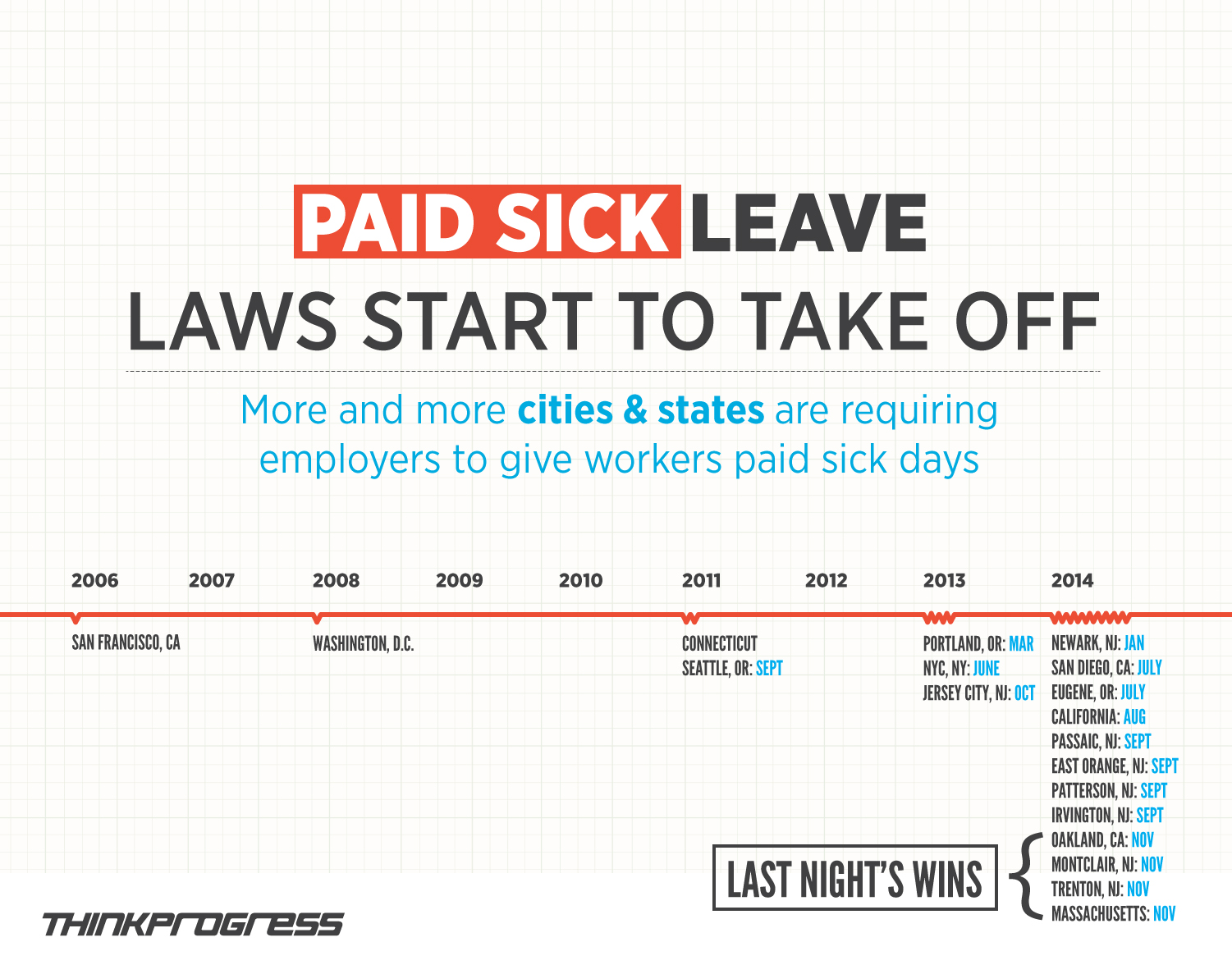Guaranteed Paid Sick Leave
Currently there is no federal regulation that mandates employers to pay their employees for sick time. Although many companies voluntarily offer their full-time employees some paid sick leave, numerous U.S. employers do not provide any paid sick leave plans. Several states and-to make matters more complicated for employers – some localities have started to pass legislation mandating certain employers offer paid sick leave to their employees.
Below is a synopsis of the current jurisdictions that mandate paid sick leave. Some are in place now, while others will go into effect on noted dates in the future.
Disclaimer: It is important to review the specific details that relate to your state and local jurisdictions. Legislation changes rapidly for many states, and the changes here are the first step in a series of new laws, so this content may become dated. If you are a user of Accounting CS, the Payroll Form and Filing Information portlet on the Home dashboard provides the state agency contact information for research. The Department of Labor website is also a useful place to look, as is Thomson Reuters Checkpoint.
California
California requires employers to provide paid sick leave beginning July 1, 2015. The Healthy Workplaces, Healthy Families Act of 2014 was signed by the governor on September 10, 2014, and will require employers to provide employees with one hour of paid sick leave for every 30 hours worked. The bill authorizes an employer to limit an employee’s use of paid sick days to 24 hours or three days in each calendar year.
Unlike several other California leave laws, there is no exemption for small employers. The new law applies to employees (exempt and non-exempt) who work in California 30 days or more in a year. This includes temporary, part-time, and seasonal employees, as well as out-of-state employees who work in California 30 or more days in a calendar year.
Oakland, CA
Effective March 2, 2015, Oakland employers with 10 or more employees will be required to provide up to 72 hours of paid sick leave per year. Employers with fewer than 10 employees must provide up to 40 hours of paid sick leave per year.
San Diego, CA
Effective April 1, 2015, employers are required to provide employees with up to five days of paid sick leave annually, based on the number of hours worked by employees.
San Francisco, CA
Employers are required to provide workers with one hour of paid sick leave for every 30 hours worked. New employees must wait 90 days before they begin to earn sick leave. There is a cap of 72 hours of accrued sick leave per employee. Furthermore, accrued paid sick leave does not expire and can be carried over from year to year.
Employers with fewer than 10 employees may have a cap of 40 hours of accrued sick leave.
Connecticut
New legislation changes the method for determining if a non-manufacturing business is exempt from providing paid sick leave. Currently, employers must provide paid sick leave if they employ 50 or more employees in Connecticut during any of the quarters in the previous year. The determination is done annually on January 1.
Effective January 1, 2015,an employer determines if it meets the 50-employee threshold based on its payroll for the week that includes October 1 annually. In addition, employers may not fire, dismiss, or transfer employees from one job site to another to come under the 50-employee threshold. Another provision in the legislation allows employees to accrue one hour of paid sick leave for every 40 hours worked during whichever 365-day year the business uses to calculate employee benefits.
Prior to January 1, 2015, employees accrued one hour of sick leave for every 40 hours worked per calendar year. This change allows employers to start their benefit year on any date, rather than only on January 1.
Massachusetts
Effective July 1, 2015, employers will be required to provide paid sick leave to employees.
The law entitles employees working for an employer with 11 or more employees to earn up to 40 hours of paid sick leave each calendar year. Employees that have employers with fewer than 11 employees would be entitled to up to 40 hours of unpaid sick leave each calendar year.
Other Local Sick Leave Requirements
District of Columbia
Employers with at least 100 employees must provide one hour of paid leave for every 37 hours worked, up to seven days a year. Paid sick leave is accrued at the beginning of employment and usable after 90 days of employment.
New Jersey
Note the similarities with paid sick leave requirements below:
East Orange, NJ
Effective January 7, 2015, private employers in East Orange are required to provide one hour of paid sick leave for every 30 hours worked, up to 40 hours a year. Employees working for employers with 10 or more employees will be eligible to earn up to five days of paid sick leave per year, while employees working for employers with nine or fewer employees will be eligible to earn up to three days per year. Accrual of paid sick time begins on the date of hire, but cannot be used until after 90 days of employment.
Irvington, NJ
Effective January 28, 2015, private employers in Irvington are required to provide one hour of paid sick leave for every 30 hours worked, up to 40 hours a year. Employees working for employers with 10 or more employees will be eligible to earn up to five days of paid sick leave per year, while employees working for employers with nine or fewer employees will be eligible to earn up to three days per year. Accrual of paid sick time begins on the date of hire, but cannot be used until after 90 days of employment.
Jersey City, NJ
Private employers in Jersey City with at least 10 employees are required to provide one hour of paid sick leave for every 30 hours worked, up to 40 hours a year. Accrual of paid sick time begins on the date of hire, but cannot be used until after 90 days of employment.
Montclair, NJ
Effective March 4, 2015, private employers in Montclair are required to provide one hour of paid sick leave for every 30 hours worked, up to 40 hours a year. Employees working for employers with 10 or more employees will be eligible to earn up to five days of paid sick leave per year, while employees working for employers with nine or fewer employees will be eligible to earn up to three days per year. Accrual of paid sick time begins on the date of hire, but cannot be used until after 90 days of employment.
Newark City, NJ
Private employers in Newark with at least 10 employees are required to provide one hour of paid sick leave for every 30 hours worked, up to 40 hours a year. Accrual of paid sick time begins on the date of hire, but cannot be used until after 90 days of employment.
Passaic, NJ
Effective January 3, 2015, private employers in Passaic are required to provide one hour of paid sick leave for every 30 hours worked, up to 40 hours a year. Employees working for employers with 10 or more employees will be eligible to earn up to five days of paid sick leave per year, while employees working for employers with nine or fewer employees will be eligible to earn up to three days per year. Accrual of paid sick time begins on the date of hire, but cannot be used until after 90 days of employment.
Paterson, NJ
Effective January 10, 2015, private employers in Paterson are required to provide one hour of paid sick leave for every 30 hours worked, up to 40 hours a year. Employees working for employers with 10 or more employees will be eligible to earn up to five days of paid sick leave per year, while employees working for employers with nine or fewer employees will be eligible to earn up to three days per year. Accrual of paid sick time begins on the date of hire, but cannot be used until after 90 days of employment.
Trenton, NJ
Effective March 4, 2015, private employers in Trenton are required to provide one hour of paid sick leave for every 30 hours worked, up to 40 hours a year. Employees working for employers with 10 or more employees will be eligible to earn up to five days of paid sick leave per year, while employees working for employers with nine or fewer employees will be eligible to earn up to three days per year. Accrual of paid sick time begins on the date of hire, but cannot be used until after 90 days of employment.
New York
New York City, NY
The New York City (NYC) Department of Consumer Affairs (DCA) has issued final regulations on NYC’s Paid Sick Leave Law. NYC businesses with at least five employees are required to provide five days of paid sick leave to employees who work in NYC for more than 80 hours a year. NYC employers with fewer than five employees must provide unpaid sick leave. Employees may accumulate up to 40 hours of paid sick leave per calendar year. The regulations cover various topics, including: (a) employee notification to the employer of the need to use sick time; (b) employer demands for medical notes; (c) rate of pay; (d) joint employer liability; and (e) minimum hour increments that must be used for sick leave. Detailed information sheets, training presentations, and the regulations are available on the DCA website.
Oregon
Eugene, OR
Effective July 1, 2015, employers with employees working in the city must provide a minimum of one hour of paid sick leave for every 30 hours worked. Employees may accrue up to 40 hours of paid sick leave annually, usable after 90 days of employment.
Portland, OR
Employers with at least six employees must provide one hour of paid sick leave for every 30 hours worked, up to 40 hours of paid sick leave annually. Employees are eligible to use this leave after 90 days of employment.
Seattle, WA
Employers operating within Seattle city limits must provide paid sick and safe time to employees. Employees of businesses with between one and 49 workers may accrue up to five paid sick days per year.
Employees of businesses that have between 50 and 249 workers may accrue up to seven paid sick days per year. Furthermore, employees of businesses with more than 250 workers may accrue up to nine paid sick days per year.
More legislation is expected to be proposed and passed in 2015 and beyond.
————-
James Paille, CPP, is the Director of Operations for Thomson Reuters’ myPay Solutions and has been an executive manager in the payroll service industry for over 30 years, specializing in managing multi-location offices. A member of the APA’s Board of Directors and National Speakers Bureau, he chairs the CPP Certification Review Panel. Paille holds a BS in Accounting from St. John Fisher College in Rochester, NY.
Thanks for reading CPA Practice Advisor!
Subscribe Already registered? Log In
Need more information? Read the FAQs
Tags: Human Resources, Payroll




